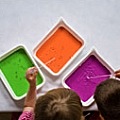- By Amy Gaulke
- Entertainment
 Print
Print  The Sciencenter is making a big deal about the smallest science at NanoDays! An annual science festival held in conjunction with over 300 science museums in the U.S., NanoDays demonstrates the special and unexpected properties found at the super tiny nanoscale. This nation-wide event is organized by the Nanoscale Informal Science Education Network (NISE Net), of which the Sciencenter is a lead partner.
The Sciencenter is making a big deal about the smallest science at NanoDays! An annual science festival held in conjunction with over 300 science museums in the U.S., NanoDays demonstrates the special and unexpected properties found at the super tiny nanoscale. This nation-wide event is organized by the Nanoscale Informal Science Education Network (NISE Net), of which the Sciencenter is a lead partner.NanoDays at the Sciencenter takes place on Saturday, March 21 from 12 – 4pm. Guests will explore nanoscale science and technology through hands-on activities, family-friendly presentations, and the Sciencenter's Nano exhibition. Admission is free all day, 10am. Over 20 interactive activities will be offered throughout the museum, delivered by Sciencenter staff and volunteers, along with researchers and students from Cornell University and Ithaca College.
Hands-on activities explore how heat energy transfers differently through a variety of materials; examine tools, such as Transmission Electron Microscopes, that nanoscientists use to work on the nanoscale; investigate how nanotechnology creates the unique properties of Kinetic sand; and discover how layers of clear tape show their "true colors" when paired with polarizing sheets. Other activities involve experimenting with invisibility, learning why graphene, the world's thinnest material, is such a good conductor, and imagining how nanotechnology could change how we eat; all while inviting discussion of technology and society from explorers of all ages.
Toddlers, preschoolers and their caregivers will hear a reading of Dr. Seuss's Horton Hears a Who!, make a pair of elephant ears, and experiment with identifying different smells.
A special Showtime! presentation, "Seeing the Super Small" by Cornell Professor, Lena Kourkouti,will explain how scientists and engineers use special microscopes and shadows to make images of things that are too small for our eyes to see.
Funded by a grant from the National Science Foundation, the Sciencenter conceives, develops, and tests educational activities that foster public awareness, engagement, and understanding of nanoscale science, engineering, and technology and use science to empower a new generation of leaders, who will shape the future through their innovation and creativity. These programs and activities reach over a half million museum guests throughout the U.S. during NanoDays.
v11i11



